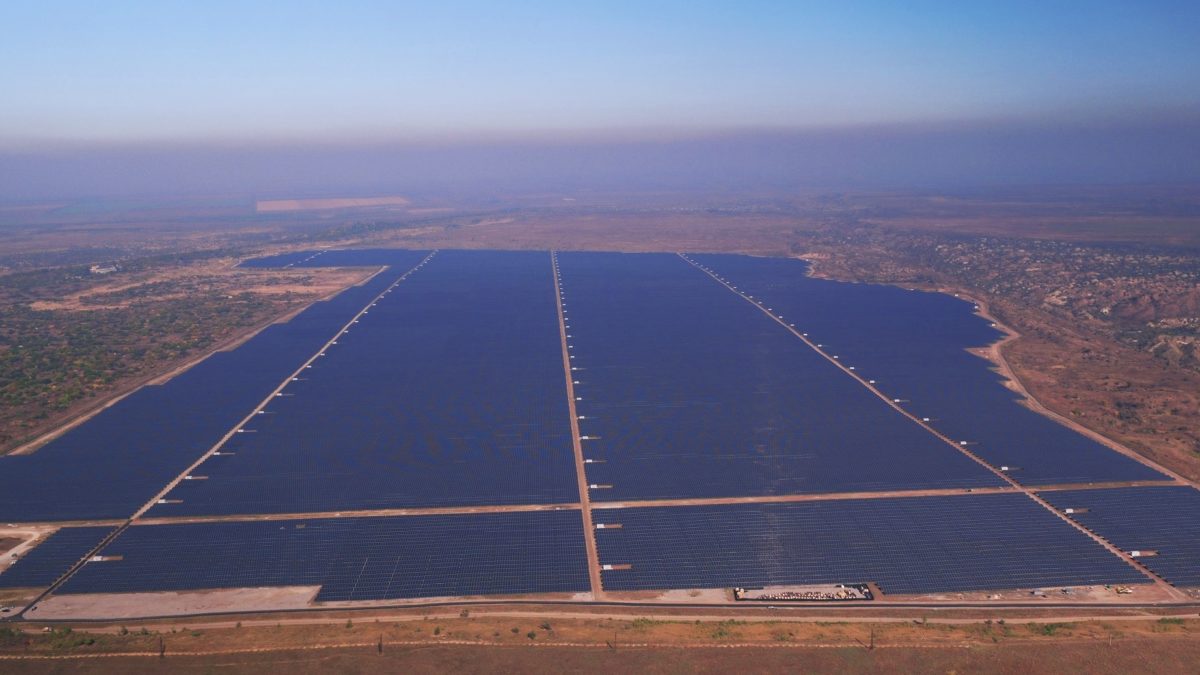Ukrainian energy company DTEK has formally opened the country’s largest – and one of Europe’s biggest – solar power plants. The 240 MW Pokrovska project was installed in just eight months, the company said.
The site began feeding electricity into the grid in October and its formal inauguration took place yesterday. “For DTEK, the Pokrovska SPP [solar power plant] is a quality milestone and a proof of our growing expertise,” said chief executive Maksim Timchenko. “With the experience we gained with our previous projects we have built a professional team, procured and installed electrical equipment from the best world manufacturers and ensured the successful integration of the solar power plant into the country’s energy system. This is a 100% national project built by Ukrainians for Ukrainians.”
Former mine quarries
The company added, 16 subcontractors with a cumulative contract volume of €48 million had been tasked with supplying services. The project is the third large solar facility developed by DTEK, at a total cost of €193 million. Some 840,000 solar panels – inevitably supplied by Risen – were placed in a disused, 437-hectare mining quarry which DTEK said cannot be used for agriculture.
Risen shipped 763 MW of modules to Ukraine in the first half of the year, hoisting the manufacturer up the ranking of top global suppliers.
Ukraine is experiencing a rush by developers to complete solar projects in time to qualify for a €0.1502/kWh feed-in-tariff before the payment gradually starts to reduce as part of an eventual switch to a reverse-auction procurement regime.
In March, coal company DTEK said it had commissioned the 200 MW Nikopol solar power plant, also in a former quarry. The potential offered by repurposing mine quarries for clean energy generation was identified by the European Commission’s Joint Research Center in July. The Solar Photovoltaic Electricity Generation: A lifeline for the European Coal Regions in Transition report estimated such disused areas could host 730 GW of renewables capacity.
Energy independence
DTEK says its large scale solar projects help accelerate Ukraine’s energy independence, an announcement made as the nation is locked into trilateral gas transmission negotiations with Russia and the EU.
Contracts governing gas transmission from Russia to Europe via Ukraine will expire this year. Russia plans to circumvent Ukraine using its Nordstream 2 and Turkstream pipelines, through the Baltic and Black seas, respectively. Ukraine, however, wants an interconnection deal incorporating its territory to apply for another decade. With relations tense since Russia annexed Crimea from Ukraine in 2014, four rounds of EU-mediated talks have thus far failed to reach a gas transmission deal.
European Commission vice-president Maroš Šefčovič said: “My key message during our meetings, both bilateral and trilateral was: ‘The time is flying and given the date there is, and there must be, a clear sense of urgency’. Therefore, I appealed to everyone around the table to be as constructive as possible.”
State-owned Russian energy giant Gazprom repeatedly interrupted the gas supply to Ukraine during the winters of 2006, 2008-2009 and 2014.
This content is protected by copyright and may not be reused. If you want to cooperate with us and would like to reuse some of our content, please contact: editors@pv-magazine.com.




1 comment
By submitting this form you agree to pv magazine using your data for the purposes of publishing your comment.
Your personal data will only be disclosed or otherwise transmitted to third parties for the purposes of spam filtering or if this is necessary for technical maintenance of the website. Any other transfer to third parties will not take place unless this is justified on the basis of applicable data protection regulations or if pv magazine is legally obliged to do so.
You may revoke this consent at any time with effect for the future, in which case your personal data will be deleted immediately. Otherwise, your data will be deleted if pv magazine has processed your request or the purpose of data storage is fulfilled.
Further information on data privacy can be found in our Data Protection Policy.